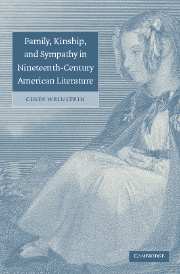Book contents
- Frontmatter
- Contents
- Acknowledgments
- Introduction
- 1 In loco parentis
- 2 “A sort of adopted daughter”: family relations in The Lamplighter
- 3 Thinking through sympathy: Kemble, Hentz, and Stowe
- 4 Behind the scenes of sentimental novels: Ida May and Twelve Years a Slave
- 5 Love American style: The Wide, Wide World
- 6 We are family, or Melville's Pierre
- Afterword
- Notes
- Select bibliography
- Index
- Cambridge Cultural Social Studies
Afterword
Published online by Cambridge University Press: 22 September 2009
- Frontmatter
- Contents
- Acknowledgments
- Introduction
- 1 In loco parentis
- 2 “A sort of adopted daughter”: family relations in The Lamplighter
- 3 Thinking through sympathy: Kemble, Hentz, and Stowe
- 4 Behind the scenes of sentimental novels: Ida May and Twelve Years a Slave
- 5 Love American style: The Wide, Wide World
- 6 We are family, or Melville's Pierre
- Afterword
- Notes
- Select bibliography
- Index
- Cambridge Cultural Social Studies
Summary
Like Pierre, Pudd'nhead Wilson imagines a world in which biological relations are created and uncreated through speech acts. Whereas Pierre and Isabel call each other brother and sister as well as husband and wife, thus performing incest linguistically if not literally, Roxy names her child her master, thereby relinquishing, albeit temporarily, her identity as mother and her child's as slave. She declares, as she switches her child, Valet de Chambre, with Judge Driscoll's child, Thomas à Becket Driscoll, “You's young Marse Tom fum dis out, en I got to practice and git used to 'memberin' to call you dat.” As critics have noted, Roxy's performative transformation of Chambers into her master, Tom, and herself as her child's mother into her child's slave imitates the rhetorical operations of slavery. Just as the laws of slavery deem the children of white fathers and black mothers slaves, and translate, “by a fiction of law and custom” (9), a person into a thing, Roxy mandates that Driscoll's son assume her son's fate, legally turning someone else, but a someone nevertheless, into a slave and a thing.
Pudd'nhead Wilson is an especially appropriate text with which to conclude my analysis of family, kinship, and sympathy. Not only does Twain's novel explore the potential fate of sympathy in a world governed by slavery and its poisonous commodification of the slave mother/child bond, but Roxy's profoundly desperate tale of maternal strength, impotence, and defeat has very specific connections with many of the novels I have already discussed.
- Type
- Chapter
- Information
- Publisher: Cambridge University PressPrint publication year: 2004
- 1
- Cited by



